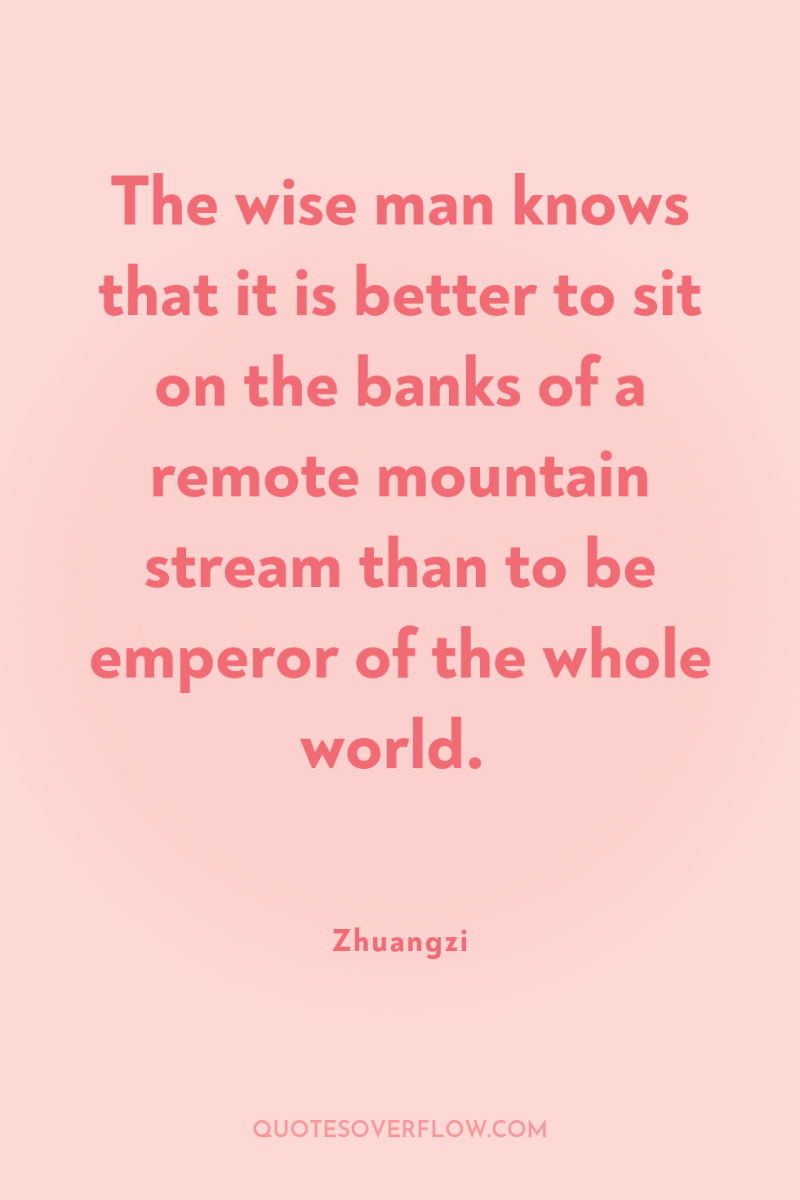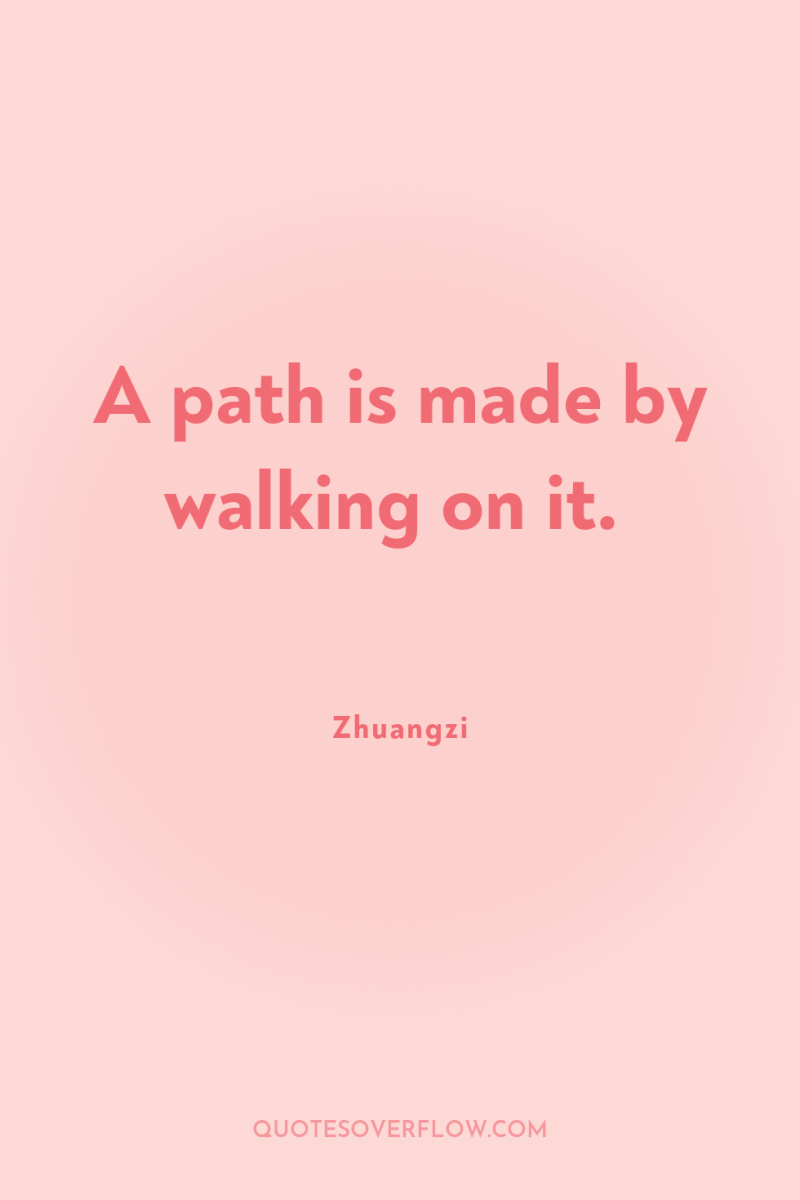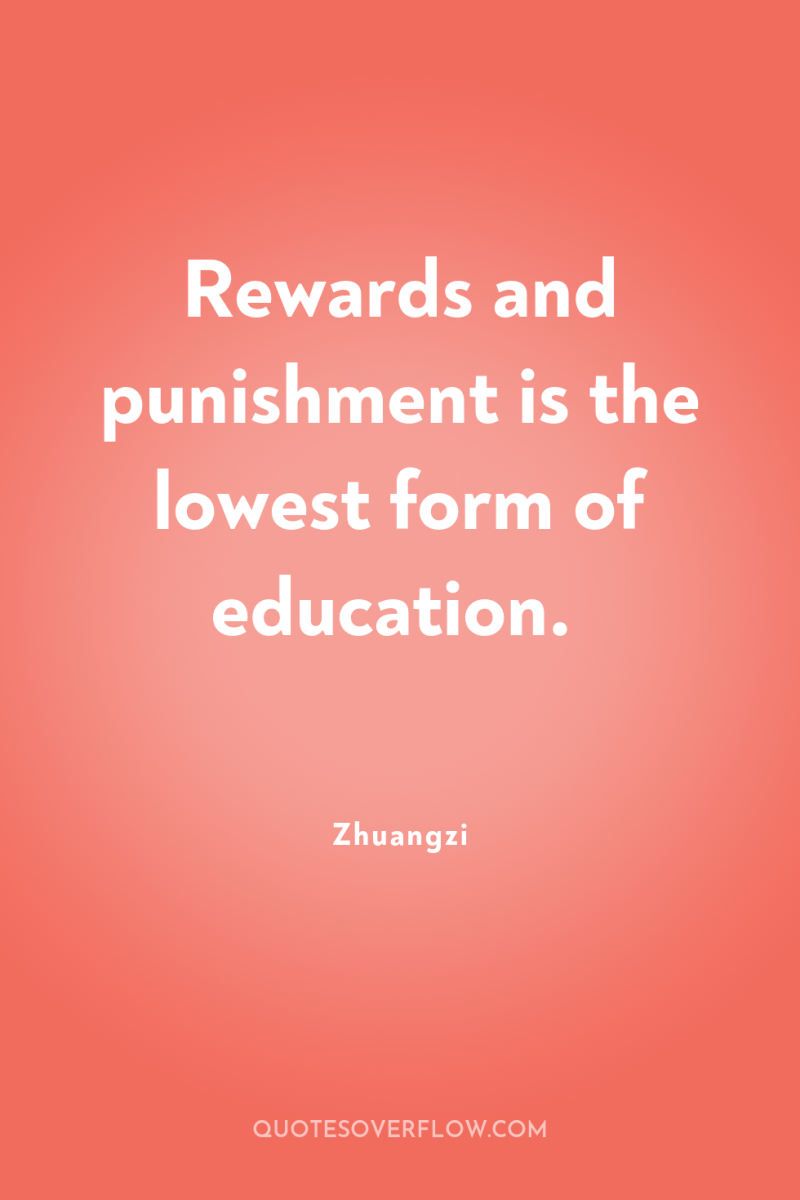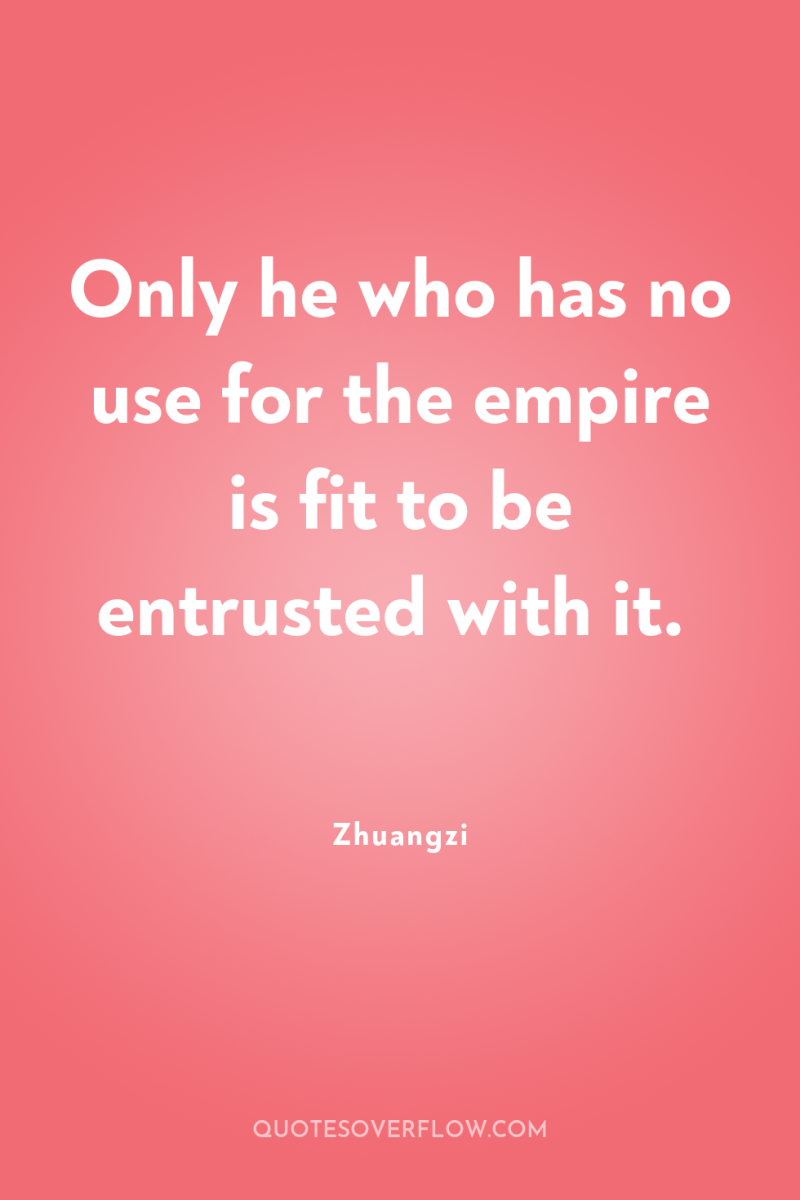1
Once upon a time, I dreamt I was a butterfly, fluttering hither and thither, to all intents and purposes a butterfly. I was conscious only of my happiness as a butterfly, unaware that I was myself. Soon I awaked, and there I was, veritably myself again. Now I do not know whether I was then a man dreaming I was a butterfly, or whether I am now a butterfly, dreaming I am a man.Zhuangzi
2
The time of the autumn floods came and the hundred streams poured into the Yellow River. … Then the Lord of the River was beside himself with Joy, believing that all the beauty in the world belonged to him alone.Zhuangzi
3
Men of the world who value the Way all turn to books. But books are nothing more than words. Words have value; what is of value in words is meaning. Meaning has something it is pursuing, but the thing that it is pursuing cannot be put into words and handed down. The world values words and hands down books but, though the world values them, I do not think them worth valuing. What the world takes to be values is not real value.Zhuangzi
4
Words are not just wind. Words have something to say. But if what they have to say is not fixed, then do they really say something? Or do they say nothing? People suppose that words are different from the peeps of baby birds, but is there any difference, or isn't there? What does the Way rely upon, that we have true and false? What do words rely upon, that we have right and wrong? How can the Way go away and not exist? How can words exist and not be acceptable? When the Way relies on little accomplishments and words reply on vain show, then we have rights and wrongs of the Confucians and the Mo-ists. What one calls right the other calls wrong; what one calls wrong the other calls right. But if we want to right their wrongs and wrong their rights, then the best to use is clarity.Zhuangzi

5
The wise man knows that it is better to sit on the banks of a remote mountain stream than to be emperor of the whole world.Zhuangzi

6
A path is made by walking on it.Zhuangzi

7
Forget the years, forget distinctions. Leap into the boundless and make it your home!Zhuangzi
8
He who knows he is a fool is not the biggest fool; he who knows he is confused is not in the worst confusion. The man in the worst confusion will end his life without ever getting straightened out; the biggest fool will end his life without ever seeing the light. If three men are traveling along and one is confused, they will still get where they are going - because confusion is in the minority. But if two of them are confused, then they can walk until they are exhausted and never get anywhere - because confusion is in the majority. .Zhuangzi
9
I cannot tell if what the world considers ‘happiness’ is happiness or not. All I know is that when I consider the way they go about attaining it, I see them carried away headlong, grim and obsessed, in the general onrush of the human herd, unable to stop themselves or to change their direction. All the while they claim to be just on the point of attaining happiness.Zhuangzi
10
So it is said, for him who understands Heavenly joy, life is the working of Heaven; death is the transformation of things. In stillness, he and the yin share a single Virtue; in motion, he and the yang share a single flow.Zhuangzi

11
Rewards and punishment is the lowest form of education.Zhuangzi
12
Yet the stupid believe they are awake, busily and brightly assuming they understand things, calling this man ruler, that one herdsman — how dense! Confucius and you are both dreaming! And when I say you are dreaming, I am dreaming, too. Words like these will be labeled the Supreme Swindle.Zhuangzi

13
Only he who has no use for the empire is fit to be entrusted with it.Zhuangzi
14
If a man crosses a riverand an empty boat collides with his own skiff, Even though he be bad tempered man He will not become very angry. But if he sees a man in the boat, He will shout at him to steer clear. If the shout is not heard, he will shout again, and yet again, and begin cursing. And all because someone is in the boat. Yet if the boat were empty, He would not be shouting, and not angry. If you can empty your own boat Crossing the river of the world, No one will oppose you, No one will seek to harm you .Zhuangzi
15
I've heard my teacher say, where there are machines, there are bound to be machine worries; where there are machine worries, there are bound to be machine hearts. With a machine heart in your breast, you've spoiled what was pure and simple; and without the pure and simple, the life of the spirit knows no rest.Zhuangzi
16
The Perfect Man uses his mind like a mirror - going after nothing, welcoming nothing, responding but not storing.Zhuangzi
17
The sage is still not because he takes stillness to be good and therefore is still. The ten thousand things are insufficient to distract his mind - that is the reason he is still.Zhuangzi
18
The Spirit Tower has its guardian, but unless it understands who its guardian is, it cannot be guarded.Zhuangzi
19
Today, I went to sleep under a plum tree. There, I dreamed I was a butterfly, flying so pleasently. Then, I fell asleep, and the dream ended. Now- I have to ask myself - am I Zhuang Zi who dreamed of a butterfly? Or am I that butterfly, dreaming I am Zhuang Zi?Zhuangzi
20
It comes out from no source, it goes back in through no aperture. It has reality yet no place where it resides; it has duration yet no beginning or end. Something emerges, though through no aperture - this refers to the fact that it has reality. It has reality yet there is no place where it resides - this refers to the dimension of space. It has duration but no beginning or end - this refers to the dimension of time. There is life, there is death, there is a coming out, there is a going back in - yet in the coming out and going back its form is never seen. This is called the Heavenly Gate. The Heavenly Gate is nonbeing. The ten thousand things come forth from nonbeing. Being cannot create being out of being; inevitably it must come forth from nonbeing. Nonbeing is absolute nonbeing, and it is here that the sage hides himself.Zhuangzi
21
When I speak of good hearing, I do not mean listening to others; I mean simply listening to yourself. When I speak of good eyesight, I do not mean looking at others; I mean simply looking at yourself. He who does not look at himself but looks at others, who does not get hold of himself but gets hold of others, is getting what other men have got and failing to get what he himself has got. He finds joy in what brings joy to other men, but finds no joy in what would bring joy to himself. .Zhuangzi
22
You should find the same joy in one condition as in the other and thereby be free of care, that is all. But now, when the things that happened along take their leave, you cease to be joyful. From this point of view, though you have joy, it will always be fated for destruction.Zhuangzi
23
Can you be a little baby? The baby howls all day, yet its throat never gets hoarse - harmony at its height! The baby makes fists all day, yet its fingers never get cramped - virtue is all it holds to. The baby stares all day without blinking its eyes - it has no preferences in the world of externals.Zhuangzi
24
Words have value; what is of value in words is meaning. Meaning has something it is pursuing, but the thing that it is pursuing cannot be put into words and handed down.Zhuangzi
25
The little child learns to speak, though it has no learned teachers - because it lives with those who know how to speak.Zhuangzi
26
Zhuangzi's wife died. When Huizu went to convey his condolences, he found Zhuangzi sitting with his legs sprawled out, pounding on a tub and singing. "You lived with her, she brought up your children and grew old, " said Huizu. "It should be enough simply not to weep at her death. But pounding on a tub and singing - this is going too far, isn't it?" Zhuangzi said, "You're wrong. When she first died, do you think I didn't grieve like anyone else? But I looked back to her beginning and the time before she was born. Not only the time before she was born, but the time before she had a body. Not only the time before she had a body, but the time before she had a spirit. In the midst of the jumble of wonder and mystery a change took place and she had a spirit. Another change and she had a body. Another change and she was born. Now there's been another change and she's dead. It's just like the progression of the four seasons, spring, summer, fall, winter." Now she's going to lie down peacefully in a vast room. If I were to follow after her bawling and sobbing, it would show that I don't understand anything about fate. So I stopped.Zhuangzi
27
When men do not forget what can be forgotten but forget what cannot be forgotten - that may be called true forgetting.Zhuangzi
28
When a man does not dwell in self, then things will of themselves reveal their forms to him. His movement is like that of water, his stillness like that of a mirror, his responses like those of an echo.Zhuangzi
29
The man who has forgotten self may be said to have entered Heaven.Zhuangzi
30
In the midst of darkness, he alone sees the dawn; in the midst of the soundless, he alone hears harmony.Zhuangzi
31
Life, death, preservation, loss, failure, success, poverty, riches, worthiness, unworthiness, slander, fame, hunger, thirst, cold, heat - these are the alternations of the world, the workings of fate. Day and night they change place before us, and wisdom cannot spy out their source. Therefore, they should not be enough to destroy your harmony; they should not be allowed to enter the storehouse of the spirit. If you can harmonize and delight in them, master them and never be at a loss for joy; if you can do this day and night without break and make it be spring with everything, mingling with all and creating the moment within your own mind - this is what I call being whole in power. .Zhuangzi
32
Men all pay homage to what understanding understands, but no one understands enough to rely upon what understanding does not understand and thereby come to understand.Zhuangzi
33
Understanding that rests in what it does not understand is the finest.Zhuangzi
34
If a man, having lashed two hulls together, is crossing a river, and an empty boat happens along and bumps into him, no matter how hot-tempered the man may be, he will not get angry. But if there should be someone in the other boat, then he will shout out to haul this way or veer that. If his first shout is unheeded, he will shout again, and if that is not heard, he will shout a third time, this time with a torrent of curses following. In the first instance, he wasn't angry; now in the second he is. Earlier he faced emptiness, now he faces occupancy. If a man could succeed in making himself empty, and in that way wander through the world, then who could do him harm? .Zhuangzi
35
You can't discuss the ocean with a well frog - he's limited by the space he lives in. You can't discuss ice with a summer insect - he's bound to a single season.Zhuangzi
36
In the world everyone knows enough to pursue what he does not know, but no one knows enough to pursue what he already knows. Everyone knows enough to condemn what he takes to be no good, but no one knows enough to condemn what he has already taken to be good.Zhuangzi
37
Suppose I try saying something. What way do I have of knowing that if I say I know something I don't really not know it? Or what way do I have of knowing that if I say I don't know something I don't really in fact know it?Zhuangzi
38
With all the confusion in the world these days, no matter how often I point the way, what good does it do? And if I know it does no good and still make myself do it, this too is a kind of confusion. So it is best to leave things alone and not force them. If I don't force things, at least I won't cause anyone any worry.Zhuangzi
39
The petty thief is imprisoned but the big thief becomes a feudal lord.Zhuangzi
40
People who excuse their faults and claim they didn't deserved to be punished - there are lots of them. But those who don't excuse their faults and admit they didn't deserve to be spared - they are few.Zhuangzi
41
If you'd called me an ox, I'd have said I was an ox; if you'd called me a horse, I'd have said I was a horse. If the reality is there and you refuse to accept the name men give it, you'll only lay yourself open to double harassment.Zhuangzi
42
The True Man of ancient times knew nothing of loving life, knew nothing of hating death. He emerged without delight; he went back in without a fuss. He came briskly, he went briskly, and that was all. He didn't forget where he began; he didn't try to find out where he would end. He received something and took pleasure in it; he forgot about it and handed it back again.Zhuangzi
43
He who has mastered the true nature of life does not labor over what life cannot do. He who has mastered the true nature of fate does not labor over what knowledge cannot change.Zhuangzi
44
Cease striving. Then there will be transformation.Zhuangzi
45
When you're betting for tiles in an archery contest, you shoot with skill. When you're betting for fancy belt buckles, you worry about your aim. And when you're betting for real gold, you're a nervous wreck. Your skill is the same in all three cases - but because one prize means more to you than another, you let outside considerations weigh on your mind. He who looks too hard at the outside gets clumsy on the inside.Zhuangzi
46
We can't expect a blind man to appreciate beautiful patterns or a deaf man to listen to bells and drums. And blindness and deafness are not confined to the body alone - the understanding has them, too.Zhuangzi
47
A man like this will not go where he has no will to go, will not do what he has no mind to do. Though the world might praise him and say he had really found something, he would look unconcerned and never turn his head; though the world might condemn him and say he had lost something, he would look serene and pay no heed. The praise and blame of the world are no loss or gain to him.Zhuangzi
48
Flow with whatever may happen, and let your mind be free: Stay centered by accepting whatever you are doing. This is the ultimate.Zhuangzi
49
The baby looks at things all day without winking; that is because his eyes are not focused on any particular object. He goes without knowing where he is going, and stops without knowing what he is doing. He merges himself within the surroundings and moves along with it. These are the principles of mental hygiene.Zhuangzi
50
Where is that man who has forgotten words that I may have a word with him?Zhuangzi
51
Things joined by profit, when pressed by misfortune and danger, will cast each other aside.Zhuangzi
52
A child, obeying his father and mother, goes wherever he is told, east or west, south or north. And the yin and yang - how much more are they to a man than father or mother! Now that they have brought me to the verge of death, if I should refuse to obey them, how perverse I would be! What fault is it of theirs? The Great Clod burdens me with form, labors me with life, eases me in old age, and rests me in death. So if I think well of my life, for the same reason I must think well of my death. When a skilled smith is casting metal, if the metal should leap up and say, 'I insist upon being made into a Moye! ' he would surely regard it as very inauspicious metal indeed. Now, having had the audacity to take on human form once, if I should say, 'I don't want to be anything but a man! Nothing but a man! ', the Creator would surely regard me as a most inauspicious sort of person. So now I think of heaven and earth as a great furnace, and the Creator as a skilled smith. Where could he send me that would not be all right? I will go off to sleep peacefully, and then with a start I will wake up. .Zhuangzi
53
You have only to rest in inaction and things will transform themselves. Smash your form and body, spit out hearing and eyesight, forget you are a thing among other things, and you may join in great unity with the deep and boundless.Zhuangzi
54
A beam or pillar can be used to batter down a city wall, but it is no good for stopping up a little hole - this refers to a difference in function. Thoroughbreds like Qiji and Hualiu could gallop a thousand li in one day, but when it came to catching rats they were no match for the wildcat or the weasel - this refers to a difference in skill. The horned owl catches fleas at night and can spot the tip of a hair, but when daylight comes, no matter how wide it opens its eyes, it cannot see a mound or a hill - this refers to a difference in nature. Now do you say, that you are going to make Right your master and do away with Wrong, or make Order your master and do away with Disorder? If you do, then you have not understood the principle of heaven and earth or the nature of the ten thousand things. This is like saying that you are going to make Heaven your master and do away with Earth, or make Yin your master and do away with Yang. Obviously it is impossible.Zhuangzi
55
Right is not right; so is not so. If right were really right, it would differ so clearly from not right that there would be no need for argument. If so were really so, it would differ so clearly from not so that there would be no need for argument. Forget the years; forget distinctions. Leap into the boundless and make it your home!Zhuangzi
56
Everything has its "that, " everything has its "this." From the point of view of "that" you cannot see it, but through understanding you can know it. So I say, "that" comes out of "this" and "this" depends on "that" - which is to say that "this" and "that" give birth to each other. But where there is birth there must be death; where there is death there must be birth. Where there is acceptability there must be unacceptability; where there is unacceptability there must be acceptability. Where there is recognition of right there must be recognition of wrong; where there is recognition of wrong there must be recognition of right. Therefore the sage does not proceed in such a way, but illuminates all in the light of Heaven. He too recognizes a "this, " but a "this" which is also "that, " a "that" which is also "this." His "that" has both a right and a wrong in it; his "this" too has both a right and a wrong in it. So, in fact, does he still have a "this" and "that"? Or does he in fact no longer have a "this" and "that"? A state in which "this" and "that" no longer find their opposites is called the hinge of the Way. When the hinge is fitted into the socket, it can respond endlessly. Its right then is a single endlessness and its wrong too is a single endlessness. So, I say, the best thing to use is clarity.Zhuangzi
57
We are born from a quiet sleep, and we die to a calm awakeningZhuangzi
58
You forget your feet when the shoes are comfortable. You forget your waist when the belt is comfortable. Understanding forgets right and wrong when the mind is comfortable. There is no change in what is inside, no following what is outside, when the adjustment to events is comfortable. You begin with what is comfortable and never experience what is uncomfortable when you know the comfort of forgetting what is comfortable.Zhuangzi
59
Don't you know about the praying mantis that waved its arms angrily in front of an approaching carriage, unaware that they were incapable of stopping it? Such was the high opinion it had of its talents.Zhuangzi
60
Master Dongguo asked Zhuangzi, "This thing called the Way - where does it exist?" Zhuangzi said, "There's no place it doesn't exist."" Come, " said Master Dongguo, "you must be more specific! "" It is in the ant."" As low a thing as that?"" It is in the panic grass."" But that's lower still! "" It is in the tiles and shards."" How can it be so low?"" It is in the piss and shit!Zhuangzi
61
Forget about life, forget about worrying about right and wrong. Plunge into the unknown and the endless and find your place there!Zhuangzi
62
The tailor bird builds her nest in deep woods, she uses no more than one branch. The mole drinks off the river, it can only fill one belly.Zhuangzi
63
Let your mind wander in simplicity, blend your spirit with the vastness, follow along with things the way they are, and make no room for personal views - then the world will be governed.Zhuangzi
64
Do not use life to give life to death. Do not use death to bring death to life.Zhuangzi
65
I dreamed I was a butterfly, flitting around in the sky; then I awoke. Now I wonder: Am I a man who dreamt of being a butterfly, or am I a butterfly dreaming that I am a man?Zhuangzi
66
I do not know whether I was then a man dreaming I was a butterfly, or whether I am now a butterfly dreaming I am a man.Zhuangzi
67
We cling to our own point of view, as though everything depended on it. Yet our opinions have no permanence; like autumn and winter, they gradually pass away.Zhuangzi
68
Those who seek to satisfy the mind of man by hampering it with ceremonies and music and affecting charity and devotion have lost their original nature.Zhuangzi
69
Happiness is the absence of the striving for happiness.Zhuangzi
70
I know the joy of fishes in the river through my own joy, as I go walking along the same river.Zhuangzi
71
Men honor what lies within the sphere of their knowledge, but do not realize how dependent they are on what lies beyond it.Zhuangzi
72
Cherish that which is within you, and shut off that which is without; for much knowledge is a curse.Zhuangzi
73
Great wisdom is generous; petty wisdom is contentious. Great speech is impassioned, small speech cantankerous.Zhuangzi
74
Rewards and punishments are the lowest form of education.Zhuangzi
75
Life comes from the earth and life returns to the earth.Zhuangzi